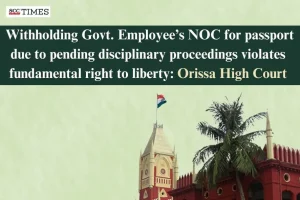Orissa High Court: While hearing a writ petition under Article 226 of the Constitution, wherein the petitioner, a government doctor nearing retirement, sought issuance of a No Objection Certificate (‘NOC’) to enable processing of his passport application for visiting his daughter in Singapore, a Single Judge Bench of Sashikanta Mishra, J., held that refusal of NOC by the Health and Family Welfare Department, Government of Orissa, solely on the ground of unauthorised absence and pendency of disciplinary or vigilance proceedings, amounted to infringement of the petitioner’s fundamental right to personal liberty under Article 21 of the Constitution. The Court further observed that the Passport Act, 1967 (‘Passport Act’) does not impose any absolute bar on travel abroad due to pending disciplinary proceedings and accordingly quashed the rejection orders.
Background:
The petitioner, who was due to retire in early 2026, sought to visit his daughter residing in Singapore. He applied for a passport and, as required for government servants, requested issuance of an NOC from the Health and Family Welfare Department. His application was rejected in July 2022 on the ground of unauthorized absence since 2013 and the pendency of three departmental proceedings. A subsequent writ petition was disposed of in July 2024, granting liberty to reapply if circumstances changed. He reapplied in September 2024, noting that one departmental proceeding had been dropped, but his request was again rejected in March 2025.
The petitioner contended that one vigilance case had ended in acquittal, while another was pending without trial commencement, and he had cooperated fully with the investigation. He argued that denial of NOC violated his fundamental right to travel abroad under Article 21 of the Constitution.
The State, in its counter affidavit, maintained that suspension and unauthorized absence justified the pendency of proceedings, two of which were still active. However, the Regional Passport Officer referred to clauses 4.23 to 4.25 of the Passport Manual, 2020 (‘Passport Manual’), which mandated submission of NOC by government employees and clarified that such requirement could not be waived.
Consequently, in rejoinder, the petitioner stressed that his purpose was only to visit his daughter and grandchild, and that executive instructions could not curtail constitutional rights.
Analysis and Decision:
The Court observed that, from a reading of the letter dated 28-01-2014 issued by the Special Secretary to the Government in the Home Department, there is no positive order stating that an NOC shall not be issued if any disciplinary proceeding is pending. It has only been negatively stated that an NOC would be issued if there is no departmental proceeding. The Court noted that the question which falls for consideration is whether it is legally permissible for the Government to impose such a condition.
The Court emphasised that if a disciplinary proceeding is pending against a government employee, refusal of NOC would mean that he cannot apply for a passport, which in turn implies that he cannot travel abroad. The Court further observed that there is nothing in the Passport Act which even remotely suggests that pendency of disciplinary or vigilance proceedings would stand as an absolute bar for grant of passport. However, clauses 4.23 to 4.25 of the Passport Manual placed certain conditions for government employees.
On the facts and executive instructions referred to, the Court found it appropriate to rely upon the settled position of law laid down in the judgment of the Supreme Court in Maneka Gandhi v. Union of India, (1978) 1 SCC 248, wherein Article 21 of the Constitution was given an extended meaning.
The Court observed that the Passport Act does not place an absolute bar for travel abroad on the ground of pendency of disciplinary or criminal proceedings. The Court emphasised that the letter dated 28-01-2014 cannot by any stretch of imagination be treated as enacted law. However, it indirectly curbs the right of a person to travel abroad, for without NOC, the employee cannot even apply for a passport. Consequently, the Court held that the letter places an embargo on the fundamental right of a citizen to travel abroad, amounting to infringement of the right to liberty guaranteed under Article 21 of the Constitution.
The Court further noted that the restriction imposed by the State Government is unjustified for the reason that mere pendency or contemplation of disciplinary proceedings cannot be equated with proven guilt. The Court emphasised that such a view militates against the fundamental tenet of criminal jurisprudence that every person is presumed innocent until proven guilty. Thus, the Court held that non-issue of NOC on the cited ground cannot be sustained in law.
The Court, therefore, concluded that refusal of NOC on the ground of pendency of disciplinary or criminal proceedings amounts to an indirect infringement of the fundamental right to personal liberty guaranteed under Article 21 of the Constitution.
Holding such denial unsustainable in law, the Court allowed the writ petition, quashed the rejection orders and directed the authorities concerned to issue the NOC in favour of the petitioner without any further delay, and in any case within six weeks from the date of the judgment.
[Ashok Kumar Behera v. State of Orissa, 2025 SCC OnLine Ori 3963, decided on 11-11-12025]
Advocates who appeared in this case:
For the Petitioner: Sidheswar Mallik, P.C. Das, M. Mallik, S. Malllick & A.P. Mohanty, Advocates.
For the Opposite Parties: S.N. Pattnaik, Addl. Government Advocate; P.K. Parhi, DSGI along with S. Patra, CGC.


